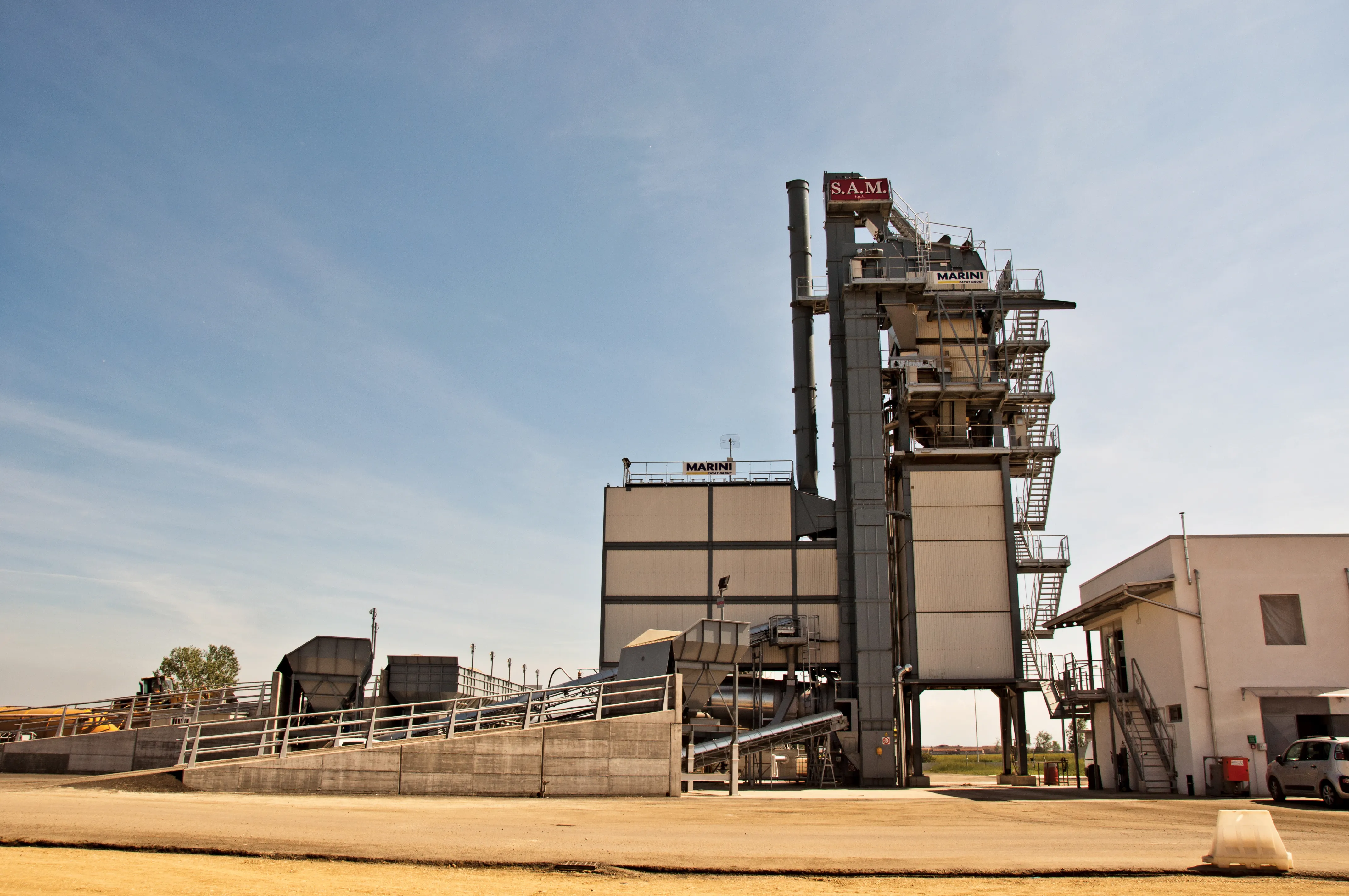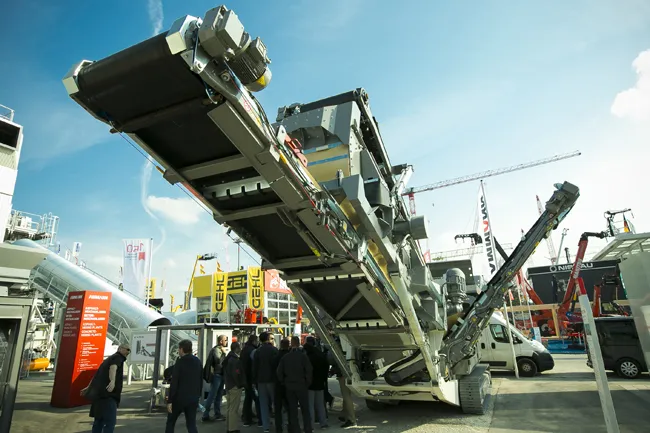Retrofitting an existing asphalt plant is only the first step in the successful production of mixes containing RAP –fine tuning and know-how are also required. The Fayat Group, owner of Marini, shares some of its secrets with Kristina Smith Many asphalt producers are making mistakes when producing mixes containing RAP, says Mikael Azran, head of marketing for Fayat mixing plants. The result is that they are wasting energy and could be in danger of producing lower quality mixes.
November 14, 2013
Read time: 4 mins

Retrofitting an existing asphalt plant is only the first step in the successful production of mixes containing RAP –fine tuning and know-how are also required. The Fayat Group, owner of Marini, shares some of ITS secrets with Kristina Smith
Many asphalt producers are making mistakes when producing mixes containing RAP, says Mikael Azran, head of marketing for217 Fayat mixing plants. The result is that they are wasting energy and could be in danger of producing lower quality mixes.
“The bigger local players, who are competing against the national players, will often start straight away to produce mixes with 35% RAP. And that’s when they can get into trouble,” says Azran. “When big companies start to use RAP, they start small – say, with 10% RAP – and they check everything is OK, find out what the issues are and gradually increase the proportion of RAP they are using. Getting it right can be quite empirical.”
Addressing details such as covering aggregates, checking that sensors are adjusted properly and minimising the air going into the drum, can all lead to energy efficiencies. Mixing cycles may need to be altered too, in order to ensure the best quality product.
There are several different ways of adapting existing plants to take RAP, which vary depending on the type of plant, the proportion or RAP to be used and the scale of investment. Continuous plants are relatively easy to adapt, with most that were built in the last 10 to 15 years already future-proofed to take RAP by adding it into the mixer.
Batch plants can also be retrofitted so that RAP is added into the mixer, but this can be more complicated and expensive than for continuous plants. Cheaper adaptations can be made if the virgin aggregate and RAP are combined and heated before the mixer, although this means the aggregate has to bypass the screens which could potentially impact on the quality of the mix.
Adding RAP by these means allows up to 30% RAP to be used. To use higher volumes of RAP, producers must invest in a parallel drum which heats the RAP to a certain level before it is mixed with the virgin aggregate. This represents a much more substantial investment.
All of these methods require some heat exchange between the heated virgin aggregate and the RAP which means the virgin aggregate must be overheated first. The result is a hefty energy bill – which can be reduced with warm-mix.
“The future is to combine recycling and warm mix,” says Azran. “This is what everybody is working on.”
Fayat Group’s solution is a system called AquaBLACK, a technology which comes from Maxam in the US through a partnership arrangement. Fayat company273 Marini launched AquaBLACK in 2011 in Asia and 2012 in Europe.
According to Azran, using AQUABLack to reduce the mix temperature by 30°C to 130°C, saves 10kWh of drying energy per tonne of asphalt produced. The added bonus is that 5% to 7% more RAP can be added to the mix.
Unlike most foamed bitumen systems which use bitumen injected through a nozzle, AquaBLACK injects water under pressure into the bitumen pipe through a ring inside the bitumen pipe.
“It can be added to any kind of plant – continuous, batch – as long as you have a small piece of pipe available,” says Azran. The mixing ring is added into the bitumen pipe close to the mixer, with different diameters available to suit different sizes of pipe.
However, many owners are taking the decision to retrofit rather than replace, due to the economic situation in much of Europe. Owners of plants which are 15 to 20 years old are replacing elements such as bitumen tanks, when in more buoyant times they may have invested in a whole new plant.
“The volume of activity for retrofitting has increased significantly,” says Azran, “Although not to a level which compensates for the loss of demand for new plants.”
Many asphalt producers are making mistakes when producing mixes containing RAP, says Mikael Azran, head of marketing for
“The bigger local players, who are competing against the national players, will often start straight away to produce mixes with 35% RAP. And that’s when they can get into trouble,” says Azran. “When big companies start to use RAP, they start small – say, with 10% RAP – and they check everything is OK, find out what the issues are and gradually increase the proportion of RAP they are using. Getting it right can be quite empirical.”
Addressing details such as covering aggregates, checking that sensors are adjusted properly and minimising the air going into the drum, can all lead to energy efficiencies. Mixing cycles may need to be altered too, in order to ensure the best quality product.
There are several different ways of adapting existing plants to take RAP, which vary depending on the type of plant, the proportion or RAP to be used and the scale of investment. Continuous plants are relatively easy to adapt, with most that were built in the last 10 to 15 years already future-proofed to take RAP by adding it into the mixer.
Batch plants can also be retrofitted so that RAP is added into the mixer, but this can be more complicated and expensive than for continuous plants. Cheaper adaptations can be made if the virgin aggregate and RAP are combined and heated before the mixer, although this means the aggregate has to bypass the screens which could potentially impact on the quality of the mix.
Adding RAP by these means allows up to 30% RAP to be used. To use higher volumes of RAP, producers must invest in a parallel drum which heats the RAP to a certain level before it is mixed with the virgin aggregate. This represents a much more substantial investment.
All of these methods require some heat exchange between the heated virgin aggregate and the RAP which means the virgin aggregate must be overheated first. The result is a hefty energy bill – which can be reduced with warm-mix.
“The future is to combine recycling and warm mix,” says Azran. “This is what everybody is working on.”
Fayat Group’s solution is a system called AquaBLACK, a technology which comes from Maxam in the US through a partnership arrangement. Fayat company
According to Azran, using AQUABLack to reduce the mix temperature by 30°C to 130°C, saves 10kWh of drying energy per tonne of asphalt produced. The added bonus is that 5% to 7% more RAP can be added to the mix.
Unlike most foamed bitumen systems which use bitumen injected through a nozzle, AquaBLACK injects water under pressure into the bitumen pipe through a ring inside the bitumen pipe.
“It can be added to any kind of plant – continuous, batch – as long as you have a small piece of pipe available,” says Azran. The mixing ring is added into the bitumen pipe close to the mixer, with different diameters available to suit different sizes of pipe.
Retrofit surge
At the moment, retrofitting is a "big activity" for Marini in ITS home markets of France, Germany and Italy. Some of that activity is to update plants to take RAP – maybe five to 10 per year, says Azran – although many plants have already been adapted.However, many owners are taking the decision to retrofit rather than replace, due to the economic situation in much of Europe. Owners of plants which are 15 to 20 years old are replacing elements such as bitumen tanks, when in more buoyant times they may have invested in a whole new plant.
“The volume of activity for retrofitting has increased significantly,” says Azran, “Although not to a level which compensates for the loss of demand for new plants.”









